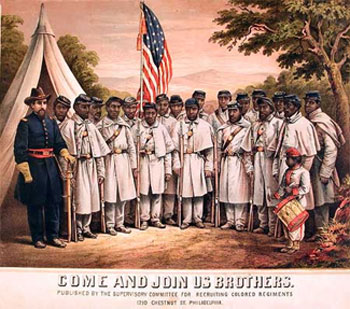
Source: Emancipation Memorial, Wikimedia

Source: Emancipation Memorial, Wikimedia
In July 1862, Abraham Lincoln informed his Cabinet that he intended to free the slaves and showed them a draft of the Emancipation Proclamation. His Cabinet advised Lincoln that he needed to wait for a major Union victory in order to issue the document. Otherwise, it would look like an act of desperation, trying to get the slaves to rise up against their masters because the Union army could not beat the Confederate army.
Lincoln used the battle of Antietam as his significant victory. Both sides lost roughly the same number of soldiers on that bloody day. However, Lincoln used the fact that Lee had to retreat from Maryland back to Virginia afterwards as cause for celebration and emancipation. He signed the Preliminary Emancipation Proclamation on Sept. 22, 1862 announcing his intention to formally free the slaves on New Year's Day, 1863.
Interactive popup. Assistance may be required.
to read an excerpt for the Emancipation Proclamation below and answer the questions that follow using your notes.
I, Abraham Lincoln, President of the United States of America, and Commander-in-Chief of the Army and Navy thereof, do hereby proclaim . . . that on the first day of January in the year of our Lord, one thousand eight hundred and sixty-three, all persons held as slaves within any State, or designated part of a State, the people whereof shall then be in rebellion against the United States shall be then, thenceforward, and forever free.




Source: Come and Join Us Brothers, Smithsonian
The Emancipation Proclamation did not actually free any slaves. Lincoln only freed the slaves in states under rebellion, which his government does not control. Slaves will become free only as the Union army rolls through the South and takes control of its territory.
It does, however, offer a powerful incentive for slaves to try and join the Northern army as it approached their plantations. Southerner leaders threatened to execute captured Union officers for trying to inspire slave rebellions. Interactive popup. Assistance may be required. called the Emancipation Proclamation, "the most execrable (utterly detestable, very bad) measure in the history of the guilty man."
Interactive popup. Assistance may be required. will try to inspire slave rebellions by issuing his famous Special Field Order No. 15 promising to any slave who joins his army "forty acres and a mule" to start a farm after the war.
The 13th amendment to the U.S. Constitution abolished slavery everywhere in the country.